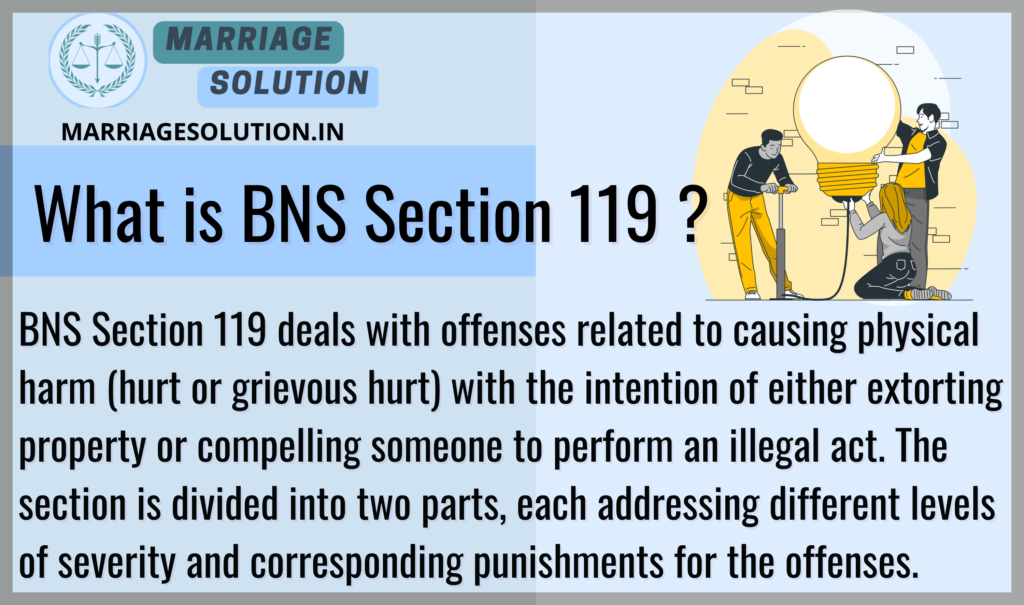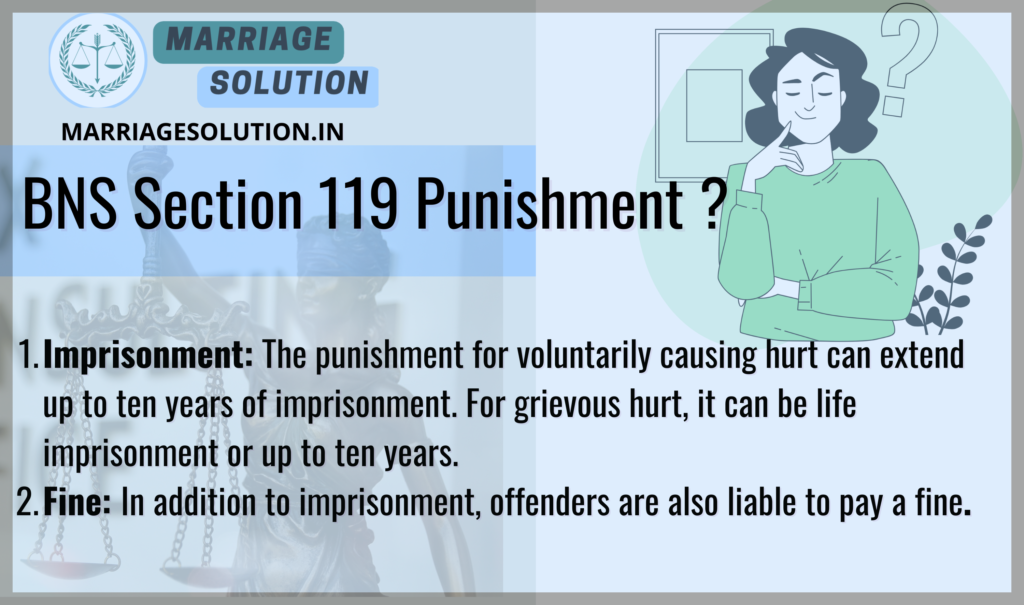Introduction of Section 119 BNS
What happens when someone uses violence not just to cause pain, but to take property or force someone into an illegal act? Section 119 of the Bharatiya Nyaya Sanhita (BNS), 2023 addresses exactly this kind of crime. It punishes those who cause hurt or grievous hurt with the intention of extortion or coercion. Whether it is threatening a shopkeeper to hand over money, or injuring someone to make them commit a crime, this section ensures strict legal consequences.
BNS Section 119(1) corresponds to IPC Section 327.
BNS Section 119(2) corresponds to IPC Section 329.
What is BNS Section 119?
BNS Section 119 deals with offenses related to causing physical harm (hurt or grievous hurt) with the intention of either extorting property or compelling someone to perform an illegal act. The section is divided into two parts, each addressing different levels of severity and corresponding punishments for the offenses.

BNS Act – BNS Section 119
(1) Whoever voluntarily causes hurt for the purpose of extorting property or valuable security, or of constraining a person to commit an illegal act, shall be punished with imprisonment up to 10 years and fine.
(2) Whoever voluntarily causes grievous hurt for the same purposes shall be punished with imprisonment for life, or with imprisonment up to 10 years, and fine.
This provision brings together and modernizes IPC Sections 327 and 329 into one structured law under the Bharatiya Nyaya Sanhita, 2023.
Explanation in Simple Language
- If a person beats someone to take money, or hurts them to make them commit a crime, it falls under Section 119.
- If the injury is minor, the offender may get up to 10 years in jail.
- If the injury is grievous (broken bones, permanent disability, severe burns, etc.), punishment can extend to life imprisonment.
- The section ensures that violence used for illegal gain or coercion is never treated lightly.
BNS 119 in Simple Points
BNS Section 119(1) – Voluntarily Causing Hurt to Extort Property or Constrain to an Illegal Act
- Definition: This section deals with a person who intentionally causes hurt to another with the purpose of either:
- Extorting property or valuable security from the victim or someone related to the victim, or
- Forcing the victim or someone related to the victim to perform an illegal act or facilitate the commission of a crime.
- Punishment:
- Imprisonment for up to 10 years.
- The person is also liable to pay a fine.
- Classification of Offense:
- Cognizable: Police can arrest without a warrant.
- Non-bailable: Bail is not easily granted.
- Triable by: Magistrate of the first class.
BNS Section 119(2) – Voluntarily Causing Grievous Hurt for Extortion or Illegal Act
- Definition: This section focuses on a person who causes grievous hurt (serious physical harm) for the same purposes as mentioned in 119(1):
- Extorting property or valuable security.
- Forcing the victim or someone connected to them to engage in illegal actions or to aid in the commission of a crime.
- Punishment:
- Imprisonment for life, or
- Imprisonment for a term that may extend up to 10 years.
- The person is also liable to pay a fine.
- Classification of Offense:
- Cognizable: Police can arrest without a warrant.
- Non-bailable: Bail is not easily granted.
- Triable by: Court of Session.
Section 119 BNS Overview
- BNS Section 119(1): This part of the section refers to the act of voluntarily causing hurt with the intent to extort property or valuable security from the victim or to force them into performing an illegal act or aiding in the commission of a crime.
- BNS Section 119(2): This part addresses cases where grievous hurt (serious physical injury) is inflicted with the same intent as described in Section 119(1). It specifically covers more severe cases involving serious injuries.
Section 119 BNS Overview – 10 Key Points
- Voluntary Infliction of Hurt: Section 119 focuses on the intentional causing of physical harm to achieve a specific unlawful goal, such as extortion or coercion.
- Purpose of Inflicting Hurt: The harm must be inflicted with the intent to force the victim to hand over property, valuables, or to coerce them into committing an illegal act.
- Simple Hurt Punishment: For causing simple hurt to extort or coerce, the offender faces up to ten years in prison and a fine.
- Grievous Hurt Punishment: If grievous hurt is inflicted for similar purposes, the offender may face life imprisonment or up to ten years in prison, in addition to a fine.
- Cognizability: Both types of offenses under Section 119 are cognizable, meaning that the police can arrest the accused without a warrant.
- Bailability: Simple hurt cases under this section are non-bailable, meaning bail is not readily granted. Grievous hurt cases are also non-bailable.
- Compounding: Offenses under this section cannot be compounded, meaning they cannot be settled out of court or dropped by the victim.
- Court Jurisdiction: Cases involving simple hurt are tried by a Magistrate of the first class, while grievous hurt cases are tried by a Court of Session.
- Legal Consequences: The section aims to prevent and punish the use of physical violence for illegal gain or coercion.
- Deterrence: By imposing severe penalties, Section 119 seeks to deter individuals from using violence to achieve unlawful ends.
Examples
- Example 1 for Section 119(1): A person threatens and physically harms a shop owner to coerce them into handing over their business’s cash reserves. This act of causing hurt is aimed at extorting property, thus falling under Section 119(1).
- Example 2 for Section 119(2): An individual severely injures a witness to a crime to prevent them from testifying against a criminal gang. The grievous hurt inflicted here is intended to coerce the victim into not participating in legal proceedings, which is covered under Section 119(2).
BNS 119 Punishment
- Imprisonment: The punishment for voluntarily causing hurt can extend up to ten years of imprisonment. For grievous hurt, it can be life imprisonment or up to ten years.
- Fine: In addition to imprisonment, offenders are also liable to pay a fine.

BNS 119 bailable or not ?
Simple Hurt: Non-bailable.
Grievous Hurt: Non-bailable.
Comparison: BNS Section 119 vs IPC Sections 327 & 329
| Section | Offence | Punishment | Bailable / Non-Bailable | Trial By |
|---|---|---|---|---|
| BNS Section 119(1) | Voluntarily causing hurt to extort property or force someone into an illegal act. | Imprisonment up to 10 years and fine. | Non-bailable | Magistrate of First Class |
| BNS Section 119(2) | Voluntarily causing grievous hurt for extortion or to force an illegal act. | Life imprisonment or up to 10 years, plus fine. | Non-bailable | Court of Session |
| IPC Section 327 (Old) | Voluntarily causing hurt to extort property or force illegal acts. | Imprisonment up to 10 years and fine. | Non-bailable | Magistrate of First Class |
| IPC Section 329 (Old) | Voluntarily causing grievous hurt for extortion or illegal acts. | Life imprisonment or up to 10 years, plus fine. | Non-bailable | Court of Session |
BNS Section 119 FAQs
What does Section 119 address?
Section 119 deals with intentionally causing harm to force someone to give up property or to coerce them into illegal actions.
What are the punishments for causing simple hurt under this section?
The punishment for causing simple hurt with intent to extort or coerce is up to ten years in prison and a fine.
What are the punishments for causing grievous hurt under this section?
For grievous hurt, the punishment can be life imprisonment or up to ten years of imprisonment, along with a fine.
Is causing hurt under Section 119 bailable?
No, both simple and grievous hurt under this section are non-bailable, meaning bail is not readily granted.
Which courts handle cases under Section 119?
Cases involving simple hurt are handled by a Magistrate of the first class, while grievous hurt cases are tried in a Court of Session.
Conclusion
Section 119 of the Bharatiya Nyaya Sanhita is a powerful safeguard against crimes where violence is used as a tool of extortion or coercion. It ensures that offenders who cause hurt or grievous hurt to steal property or force someone into illegal acts face strict punishments, from 10 years imprisonment to life imprisonment.
By distinguishing between simple hurt and grievous hurt, this law delivers proportionate justice to victims while acting as a strong deterrent against criminal gangs and extortionists. Replacing IPC Sections 327 and 329, Section 119 modernizes India’s criminal law, giving it clearer definitions, stricter enforcement, and stronger protection for society.
In short, BNS Section 119 protects individuals from violence-driven extortion and ensures that justice is uncompromising when crime is committed through fear and force.
Need Legal Support?
If you’re facing court proceedings, marriage-related issues, or any legal matter, our team at Marriage Solution – Lawyer Help is ready to guide you. Just complete our easy online enquiry form, and we’ll connect you with the right legal assistance tailored to your needs.
Finished with BNS 119 ? Continue exploring the next provisions of the Bharatiya Nyaya Sanhita (BNS), 2023. Each section includes explanations, examples, and plain-language breakdowns for easy understanding.
- BNS 120 : Voluntarily causing hurt or grievous hurt to extort confession, or to compel restoration of property .
- https://marriagesolution.in/bns_section/bns-120/
- BNS Section 121 : Voluntarily causing hurt or grievous hurt to deter public servant from his duty .
- https://marriagesolution.in/bns_section/bns-section-121/
- BNS Section 122 : Voluntarily causing hurt or grievous hurt on provocation .
- https://marriagesolution.in/bns_section/bns-section-122/
- BNS Section 123 : Causing hurt by means of poison, etc , with intent to commit an offence .
- https://marriagesolution.in/bns_section/bns-section-123/
- BNS Section 124 : Voluntarily causing grievous hurt by use of acid, etc .
- https://marriagesolution.in/bns_section/bns-section-124/
Full IPC Section List: https://marriagesolution.in/ipc-section-list
All Indian Law & Blogs: https://marriagesolution.in/indian-law/
Full BNSS Section List: https://marriagesolution.in/bnss_section-list
